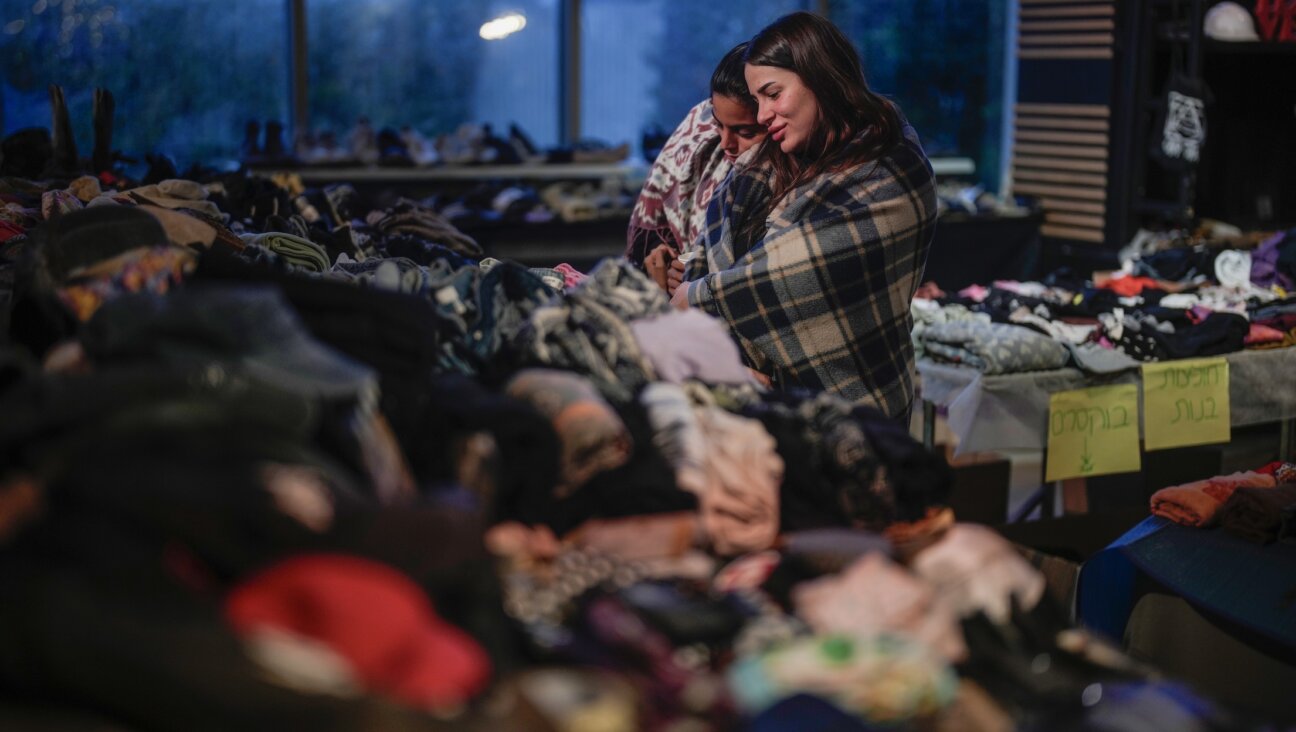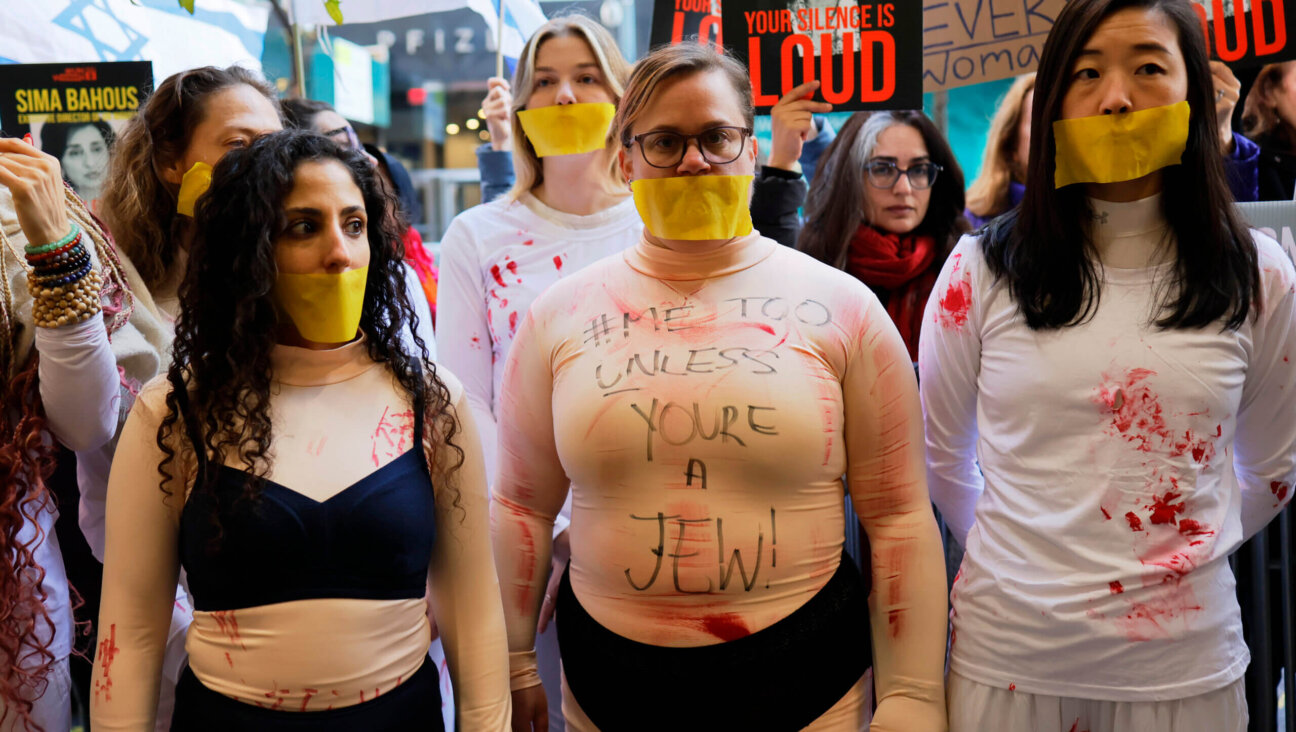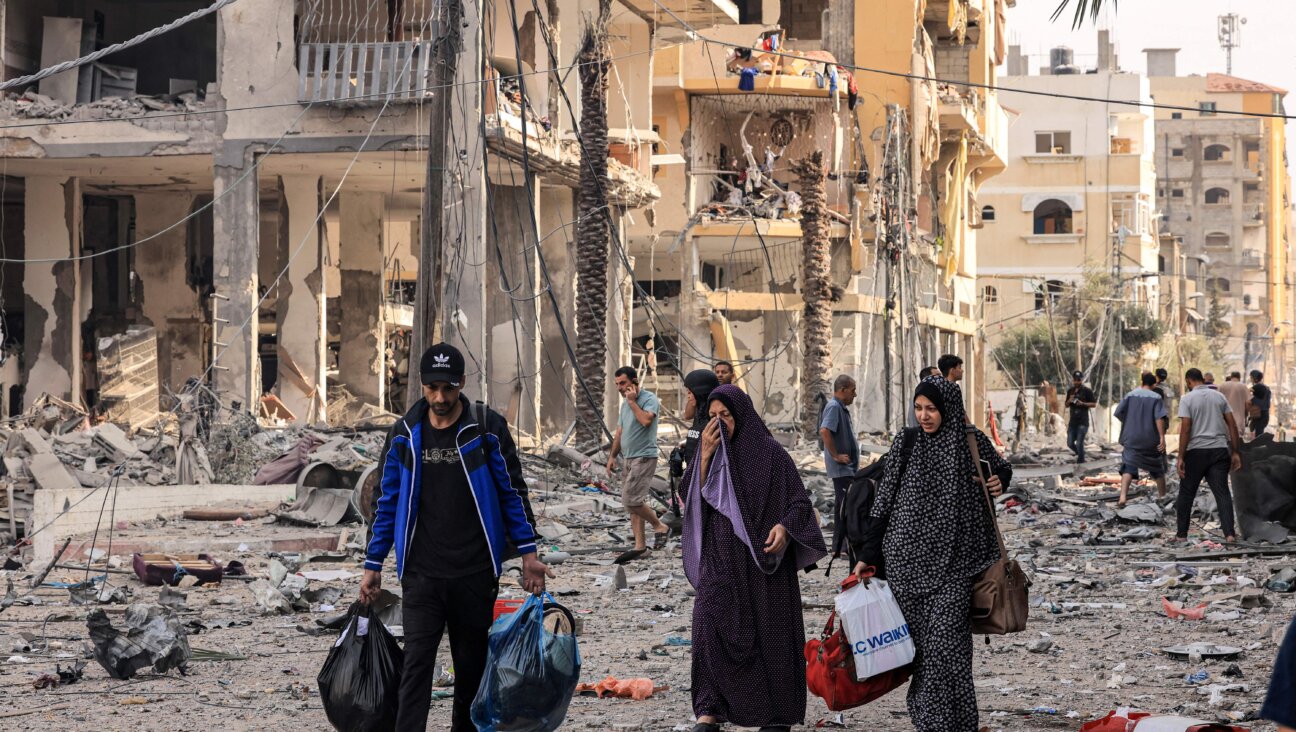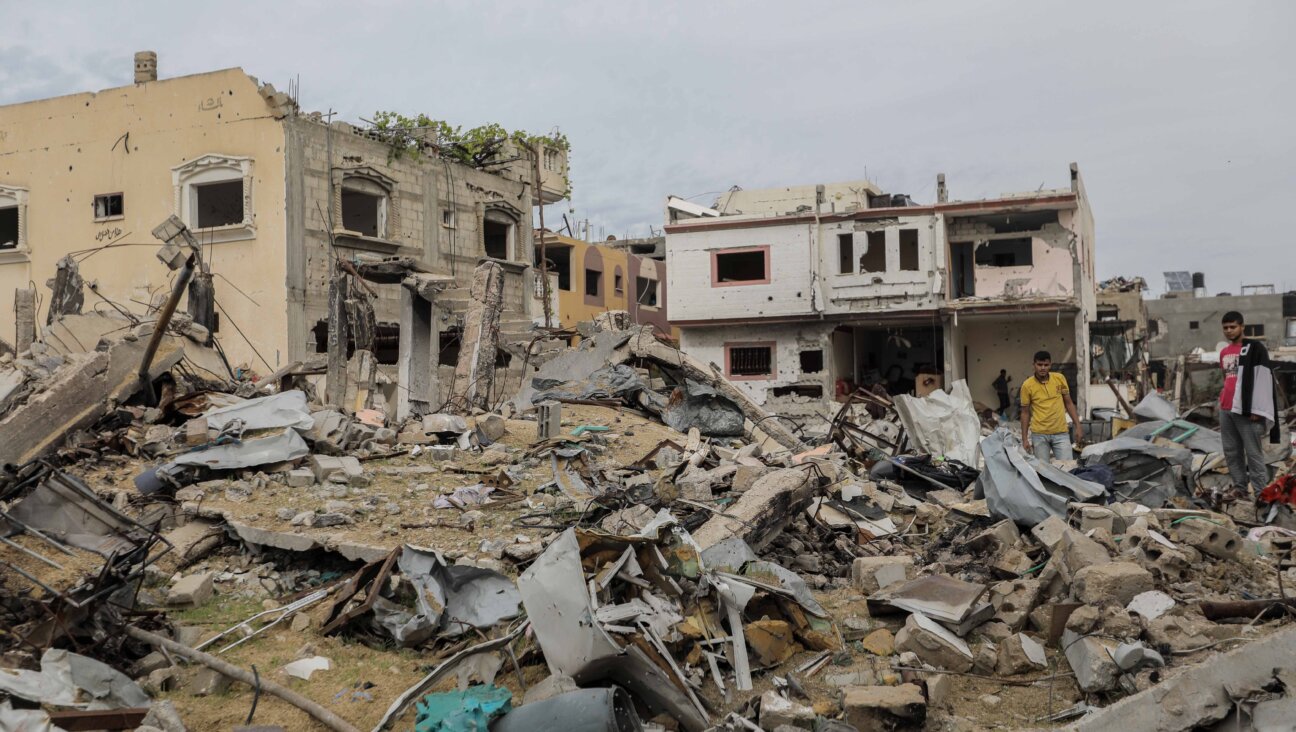‘It’s true, there’s still beauty in the world’: Israelis describe their day-to-day since the start of the war
Alumni of the Israeli Bronfman program reflect on their current roles as parents, partners, and volunteers

Graphic by Angelie Zaslavsky
Editor’s note: The Bronfman Fellowship is an educational program for Jewish high school students from North America and Israel. This is our second installment of pieces showcasing the experience of some of Bronfman’s Israeli fellows and alumni since the Oct. 7 terror attack.
‘You’ll forgive me if there’s a siren and we don’t have any place to hide?’
NATAF, Israel — I closed my eyes and I remembered that on Friday, the day before our lives changed, we went to the beach.
After a week of nights that weren’t nights, I closed my eyes and I remembered us at the beach.
I remembered the feeling of slick shards of seashells on the soles of my feet with every step we walked. I remembered the weight of the sand that Ayala-Almaz, my daughter, took from the shallow water and spread on my arms and thighs. I remembered the whisper of the waves and the quiet hush that took over when I dove into the water as the three of us entered the depths. I remembered the deep sigh that escaped me when I saw David and Ayala-Almaz coming out of the water, sitting themselves down on the blanket we spread out and gobbling up watermelon covered in sand. I remembered the pleasant sun of early October that caressed me and helped me believe that maybe there’s some order to my private universe. I remembered all of this and, finally, I succeeded in sleeping.
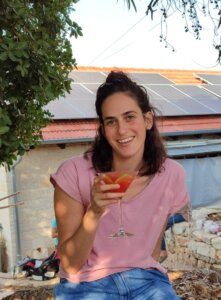
I’ve already succeeded in managing without my husband David for a month; he’s in the reserves. There are so many around me who have worse situations than I, so the proportion of my burden and guilt help me to hold on most of the time. During the day, my time moves in small, if extreme, movements. I am solely responsible for Ayala-Almaz now, and every decision that I make feels like it’s life or death. Usually, I hope she’ll make the decision instead of me. “So, we’ll make hot porridge? Yes! You wouldn’t prefer a pancake? Yes! So, yes to a pancake? No! So, back to porridge? Porr…no…porr.” In the end, she throws it all on the floor anyway. “And what do you say to the idea of going back home to sleep? Even if there’s no shelter? You’ll forgive me if there’s a siren and we don’t have any place to hide?” I’m not even able to mention the real fear of sleeping alone at home after Oct. 7.
The need to cry the cries of the hostages burns within me. Since this mess began, I haven’t been able to get to the tent encampment protest in Tel Aviv, and when I heard that there was a demonstration in Jerusalem, I felt compelled to go. It wasn’t pleasant for me to ask my mother to watch Ayelet-Almaz again, so I decided to bring her with me.
We got there at the end of a packed day, but she became so curious about the event. We stood on the side of the first crowd, Reform rabbis made havdalah and it was nice to hear the voices and to feel part of something spiritual. At some point, Ayala-Almaz saw the poster with the photos of all 30 kidnapped children. Photos of faces, one next to another.
“Oy! Dim! Dim!” [part of the word for children, yeladim]. She pointed at the poster and waved her hands excitedly! I kissed her forehead and said to her that we’ll all be happy to meet the children. “Dim! Dim! Come!” She put her hands up and signaled them to come to her. “Dim! Take mah-mah!” [baby talk for “pacifier” in Hebrew]. She took her pacifier out of her mouth and pointed it toward the photos. I kissed her again and told her that she is a kind child and a good friend.
At the same time, I felt tremendous distress. I understood that I had exposed her to too much. That suddenly the pressure of recent weeks, the fears and worries that surrounded me had faces and significance. She figured out the puzzle. Now she understands.
We left and I was sure that she would doze off in the car in a second, but the whole drive, she wept bitterly. At first, I thought she was crying how all of the children in Gaza are crying now. But after a few moments, I understood that she was crying the cries of the mothers. My daughter has a special soul; I need to protect her more.
— Irit Feingold, 34
‘It will take a long time until we’ll be able to feel happy’
BEIT HORON, Israel — More than a month has passed since Oct. 7, but it feels like much longer. On the other hand, though, I feel like only a moment has passed — the days are jumbled together into a blurry stain.
A kind of emergency routine has begun. We make plans, knowing that any moment they might change — because of a telephone conversation from a partner who was granted a surprise leave from the army, because of a bad notification or simply because, by mistake, you saw a horrifying video clip that stuck with you, and now you don’t have the strength to leave your bed.
I went back home to live with my parents. My husband has been on reserve duty since Simchat Torah. I pass my time between reserve duty in the Tel Aviv military base and visits with my partner’s family (both my sisters-in-law live in Tel Aviv now, each of them alone with a small child), and I fill the rest of the time with small activities that give me strength: meeting up with friends, writing, and going out for walks.
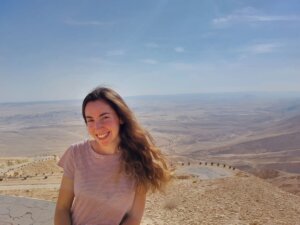
Last Monday, I was at my cousin’s bris. His father is on reserve duty now and came out on leave for his son’s birth, but already had to return to the army the evening after. The bris was held on a gorgeous farm. I met up with my extended family and all of us were in a celebratory and unburdened mood. We were excited to see the new baby and emotional about the name they chose: Neta Oz [“seedling of strength;” “Oz” specifically references the communities near Gaza that were targeted on Oct. 7]. All of the men at the bris were walking around with their guns, some of them also wearing uniforms — they had just left their bases and were already about to return.
Everything is so mixed up together. It will take a long time until we’ll be able to feel happy with all of our hearts. Now, even the things that make us happy are so diluted with sadness.
On the very same nights that the entire country celebrates small, miraculous victories, one family is getting awful news. At the same time as lives are beginning, so many lives are ending. I don’t know what’s truer — all of this death or the throbbing of life. It’s so hard to hold both of them at once.
It’s true, there’s still beauty in the world. Babies like our Neta Oz are still born, I’m still holding tightly onto the love of my partner, to our life. But I sometimes feel like holding tightly to one another is closing our eyes to the horror and suffering, to the hurt and broken hearts, to the cries of the families of the hostages. Sometimes I feel guilty for my desire to make things better for myself, this desire that compels me to close my eyes briefly, and to just pray that I never endure the suffering of those suffering now.
The mind works overtime; pressure in the chest does not relent. When I am successful, I try to focus only on what is happening now: my breath. To inhale, to hold it, and then to release. I focus on the knowledge of what is correct now: my partner being in a safe space, my coffee, my mother’s hug, my nephew’s sweet baby scent.
It’s all true: death and life, evil and beauty. But I don’t have time to involve myself with it now. Now I’m just living, day after day, moment after moment.
— Peleg Bar On, 23
‘With blessings for quiet days for us and for all of our siblings in the Diaspora’
KFAR ADUMIM, Israel — Over the past four weeks, I’ve been volunteering everywhere I can, and there’s a sense of dynamism in the air.
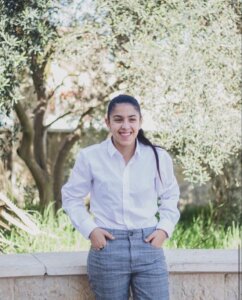
My friends and I heard there’s a hotel in Netanya for evacuees from the Gaza Envelope, so we immediately activated a war room to care for the families who had just arrived from the front lines. A war room for everything: clothing, hygiene products, shoes, and even games and sweet treats for the kids. Throughout all hours of the day, people arrived, some of them still in shock.
A meaningful encounter I had in the first week was with a pair of girls who arrived late in the evening, when we had already closed. I was distracted with organizing things so when they entered the room, I immediately asked them, “What do you need? We’ll take care of you!” And they said, “A hug.” I immediately understood that this was the entire point of my job: to look at people with embracing eyes and tell them I was here for them.
After a week and a half of being in Netanya, we received an application from the Welfare Ministry informing us that the hotels at the Dead Sea needed help. We packed up our bags and when we got there, we went from room to room with the objective of making some order of the chaos. We needed to understand what kind of population lived in the hotels so we could inform the Education Ministry about opening a school for the children. We also needed to understand the population in order to promote accessible facilities for people with disabilities and organize visits from doctors as well as mental health professionals. But, above all of the reasons the hotels needed us, the true reason we went from door to door was in order to tell our brothers and sisters that we are here with them, together. To ask them about how we could lighten their time, what we could do to help. This was a very meaningful feeling.
This is the feeling of dynamism that I spoke about at the beginning — we’re told where we’re needed, and we’ll take our things and go. It doesn’t matter where and it doesn’t matter what’s required.
With blessings for quiet days for us and for all of our siblings in the diaspora.
— Shir Achdut, 17






